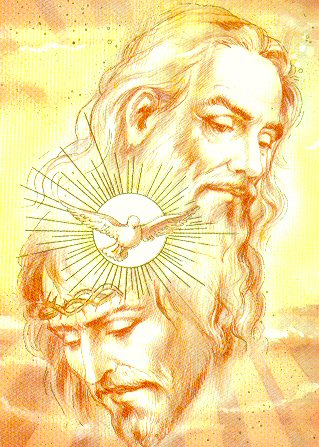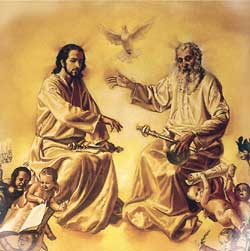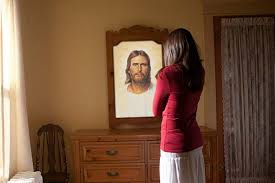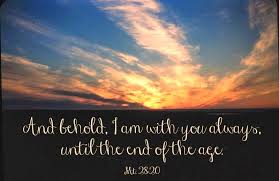
-26- 05-2024-
The Most Holy Trinity
Gospel Text: Matthew 28:16-20
 vs.16 The eleven disciples set out for Galilee, to the mountain where Jesus had arranged to meet them.
vs.16 The eleven disciples set out for Galilee, to the mountain where Jesus had arranged to meet them.
vs.17 When they saw him they fell down before him, though some hesitated.
vs.18 Jesus came up and spoke to them. He said,
“All authority in heaven and on earth has been given to me.
vs. 19 Go, therefore, make disciples of all the nations; baptize them in the name of the Father and of the Son and of the Holy Spirit,
vs.20 and teach them to observe all the commands I gave you. And know that I am with you always; yes, to the end of time.”
We have four commentators available from whom you may wish to choose . Scroll down the page with the name of the commentator required.
****************************************
Michel DeVerteuil
Lectio Divina with the Sunday Gospels
www.columba.ie
General Comments
This Sunday the liturgy invites us to celebrate the feast of the Trinity. In our church we tend to look at the Trinity as a doctrine. It is something we are meant to hold and believe; we learn about it with our minds and with our reason. But we add the proviso that we cannot understand it. “Understanding” is viewed as the important thing; if we can’t understand it we are not making much progress with it.
This is not, however, the best way to approach the doctrine of the Trinity. What we need to do is to retrace the journey made by the church. We enter into the spirituality of Jesus through the practice of lectio divina. Gradually we find that we experience the Trinity as a “mystery”. This is the liturgical sense of the word. It is something we celebrate because we know it makes us better human beings, as we follow ever more closely in the footsteps of Jesus.
 If we base ourselves on the gospel texts we come to the Trinity as something we experience. Our model is Jesus himself: the Trinity for him was what he lived, it explains how he experienced himself, how he related with his Father and with the Spirit, with others and with the earth itself. The church, reflecting on his experience, was later – and only gradually – able to formulate the church doctrine of the Trinity. The gospel reading for this Year B is an excellent starting point for this journey.
If we base ourselves on the gospel texts we come to the Trinity as something we experience. Our model is Jesus himself: the Trinity for him was what he lived, it explains how he experienced himself, how he related with his Father and with the Spirit, with others and with the earth itself. The church, reflecting on his experience, was later – and only gradually – able to formulate the church doctrine of the Trinity. The gospel reading for this Year B is an excellent starting point for this journey.
Jesus saw that authority in the world was something that was “given” to him. It was a “gift” given to him by someone in Heaven, his Father who dwells in heaven. It was not a truth that he was able to discover for himself, nor one that he came to experience from his own decisions. It was always something he had “received.”
As Son he was able to exercise this gift. He had the authority to do this. He practiced the reality of the Trinity with personal power. He exercised this authority for himself and from his own observation. Having received it from outside himself, he put it into practice in the way he related with people.
 Jesus therefore did not have to hold on to his authority. He took the decisions for himself, or it was decided for him in the name of the Father. In either case, he practiced it by handing over his authority to the care of his disciples. Since the authority was something “given” to him, he was able to give it over with no personal regrets.
Jesus therefore did not have to hold on to his authority. He took the decisions for himself, or it was decided for him in the name of the Father. In either case, he practiced it by handing over his authority to the care of his disciples. Since the authority was something “given” to him, he was able to give it over with no personal regrets.
Jesus lived his “Trinitarian Spirituality” especially from the time he felt able to depart from the world. He had always been humble in how he handled his authority; now he could be totally confident in handing on to others everything he had accomplished. This was why he could say with full freedom that he could hand everything over to the Holy Spirit.
“All authority is given to me,” he told his disciples once he had decided to leave his mission in their hands. They could “go therefore” wherever they wanted, trusting that wherever they went, he would be alongside them, adding to what they believed in whatever he wanted for them to achieve.
We too, then, must be conscious of our authority as “given”. It is never possessed by us. We too can exercise it confidently and humbly and then willingly pass it on to others when the time comes. Evil qualities like jealousy or possessiveness or a fear of letting go are symptoms that the Trinity is not real for us. It means that we take authority as ours and not as “given”.
 The things we can feel free to hand on to others include all forms of authority, especially that of our faith in Jesus. We must therefore take
The things we can feel free to hand on to others include all forms of authority, especially that of our faith in Jesus. We must therefore take
“Baptizing in the name of the Father, of the Son and of the Holy Spirit” in a very wide sense. It does not merely refer to our church baptism; it includes the entire work of the church, the process of inviting people to experience authority as Jesus did.
He takes the time to celebrate the many people who have shared this “baptism” with us. We pray that they too will have the grace to approach “all nations” with this wide and tolerant “Trinitarian Spirit.”
Prayer Reflection
Lord, we thank you for the various ways in which you reveal your presence to us:
there are times when we experience you as Father through
*teachers, community leaders,
*members of our family, spiritual guides
to whom you have given authority in heaven and on earth,
so that we feel empowered spiritually
and can assume responsibility in our workplaces and in public life.
At other times we experience you as Son,
through the great people you send us as companions.
They do not talk down to us.
When we fail in some great enterprise and have to start again, like the eleven disciples setting out disconsolately to return to Galilee,
they come up and speak to us as fellow pilgrims
who have themselves been defeated, so that they can tell us now to go out confidently and share our wisdom with all the nations.
 At other times again, you are deep within us, like our breath, our Spirit so discreet that we do not even advert to your presence;
At other times again, you are deep within us, like our breath, our Spirit so discreet that we do not even advert to your presence;
but you are the source of life and energy, always with us, so that even when we feel lost and discouraged we can say, yes, you will be there till the end of that time.
Thank you that we have been baptized in the name of the Father, of the Son and of the Holy Spirit.
Lord, people in authority often cling to those in their charge.
We tend to do it as parents, teachers, ministers in the church, political leaders.
Help us to be more like Jesus when he met the apostles in Galilee,
free enough to know that our work is not limited to the here and now,
that if we have helped others in any way we can tell them to go,
because wherever they are we will be with them.
When we understand this, we are truly baptised in the name of Trinity.
“If there is any lover of God living on this earth who is continually kept from falling, I do not know about it, for it was not shown to me. But this was shown, that in falling and in rising we are always preciously kept in the same love.” … Julian of Norwich
Lord, we pray for those who are feeling discouraged at this moment because they have committed some sin that has them feeling ashamed. Remind them that you are with them always, yes, even to the end of this time.
Lord, we pray for all of us who are called to exercise leadership
– in public life, in your church,
– in our homes and neighbourhoods, or – on the world stage.
 Help us to imitate Jesus; to be conscious, like he was, that ‘all’ authority in heaven and on earth is given to us for a time,
Help us to imitate Jesus; to be conscious, like he was, that ‘all’ authority in heaven and on earth is given to us for a time,
after which we commission those we have worked with to go out into the world.
We are not afraid to move on because we trust that whatever values they have learned from us are like commands we have given them which they will observe and will hand on in their turn,
so that we will be with them always, yes, to the end of time.
“Unity is taught by Moses; the prophets proclaim duality; in the gospels we meet the Trinity.” … St Epiphanus
Lord, you have created out human family in your image and likeness,
baptized us in the name of the Blessed Trinity.
As individuals and as cultures you have made us all different
so that each of us has been given a unique share in your universal authority
in heaven and on earth.
We exercise this authority, not as a personal possession,
but as a gift we have received from someone else in the family
and then shared with others,
so that even though we are here for a few short years and then move on,
wherever in the world your great command of love is observed
we are all present and will continue to be until the end of time.
*************************************
Thomas O’Loughlin
Liturgical Resources for the Year of Matthew
www.columba.ie
Introduction to the Celebration
 This feast is unique in that the focus of our celebration is not an aspect of the history of salvation, but reflection on the ‘nature of God‘ as we believe it has been revealed to us as Christians. Thus every Sunday is the Sunday of the Trinity, every feast, every action has a trinitarian dimension, and should any prayer be uttered or homily preached which does not include that core of faith – at least tacitly with a conclusion such as ‘through Christ our Lord’ – then we are apostates, and have ceased to be Christians and become some sort of vague deists or unitarians who value the ‘message of Jesus‘. At the outset of the celebration it is worth reflecting that today’s focus is the very essence of Christian identity. We begin every liturgy by stating that we are acting ‘In the name of the Father …’ and that is a declaration of our basic faith, not just an opening formula. Our aim in today’s liturgy should be to become more sensitive to the trinitarian cues that run right through our religion.
This feast is unique in that the focus of our celebration is not an aspect of the history of salvation, but reflection on the ‘nature of God‘ as we believe it has been revealed to us as Christians. Thus every Sunday is the Sunday of the Trinity, every feast, every action has a trinitarian dimension, and should any prayer be uttered or homily preached which does not include that core of faith – at least tacitly with a conclusion such as ‘through Christ our Lord’ – then we are apostates, and have ceased to be Christians and become some sort of vague deists or unitarians who value the ‘message of Jesus‘. At the outset of the celebration it is worth reflecting that today’s focus is the very essence of Christian identity. We begin every liturgy by stating that we are acting ‘In the name of the Father …’ and that is a declaration of our basic faith, not just an opening formula. Our aim in today’s liturgy should be to become more sensitive to the trinitarian cues that run right through our religion.
Homily Notes
1. Go back through the second reading and note how Paul’s relationship with Jesus — Jesus is Lord — leads him to adopt a way of speaking of God as Father which Jesus had taught his followers. Moreover, Jesus had spoken of sending the Spirit and so the Spirit too is spoken of as ‘Lord’.
 2. Paul is adopting a formula already in use within the churches, it is a formula that speaks of the relationship we Christians have with God: we live and move and have our being in God the Father, God the Son our Lord Jesus Christ, and God the Spirit.
2. Paul is adopting a formula already in use within the churches, it is a formula that speaks of the relationship we Christians have with God: we live and move and have our being in God the Father, God the Son our Lord Jesus Christ, and God the Spirit.
3. We do not accept ‘the trinity‘ within our minds in the way we accept other religious notions such as ‘God loves us.‘ The mystery of the Father, Son and Spirit is the mystery of God and as such cannot be comprehended by a created mind.
Rather, we accept this as part of the gracious revelation of God and respond in the way of Jesus: him we address as Lord; with him we call on the Father; from him we accept the Spirit.
***********************************
Sean Goan
Let the reader understand
www.columba.ie
Gospel
These are the closing verses of the gospel of Matthew and they illustrate very well the growing faith of the early church in what Jesus has revealed. The life, death and resurrection of Jesus witness to the activity of God the Father through him, and now at the end of the gospel  we see Jesus not leaving his disciples but promising to be with them until the end of time as they fulfil their mission of making disciples of all nations by baptising them and teaching them to observe his commands. This text is ideal for today as it is a reminder that faith in the Trinity brings with it a mission to let the whole world hear the good news about God.
we see Jesus not leaving his disciples but promising to be with them until the end of time as they fulfil their mission of making disciples of all nations by baptising them and teaching them to observe his commands. This text is ideal for today as it is a reminder that faith in the Trinity brings with it a mission to let the whole world hear the good news about God.
Reflection
It is a striking fact that in the ancient world those civilisations that were great in terms of conquest, building, literature and philosophy have left us little or nothing of their religious beliefs. On the other hand, a people who were considered of no particular significance from a small stretch of land in the eastern Mediterranean have passed on to us their enduring concept of God. This is not a god of pagan superstition nor even of the philosophers. This is Yahweh, the God of Israel, who became known to the people through the experience of their own history and who subsequently revealed himself in Jesus of Nazareth. Today we are not celebrating a mystery we are never destined to understand; rather we are contemplating the God in whose image we are made and whose name is Love.
******************************************************
Donal Neary SJ
Gospel Reflections
www.messenger.ie/bookshop
Father, Son and Spirit
When we think of the word Spirit can we think of something lively? A sort of a flow of living water; a cycle race rather than a traffic jam. The flow of life in us rather than the ways we block life. It is the spirit of God whom we call Father, Son or Christ and Spirit. We live in that sort of love. The church is called to be that sort of community.
The Trinity can make God seem totally distant. But that is not Jesus’ God. He is the one who gets right into life, bringing God into humanity as one of us. Jesus talked so much about farming, weddings, death, illness, joys, trust, creation, nature, breakfasts, gardens, dinners; he is the God of the table more than the God of the temple. His spirit flows in all of creation, love, suffering and joy; He finds us in all things.

We need that big view of God. He makes everything sacred. Even the name Father, Son and Spirit.
Our call is to flow with him, to go with the flow of God’s Spirit. We are the flow of God in the world.
We become what we receive – the love of the Trinity in the world. We become like Christ himself as we receive this bread of life, called to be his witnesses. By what we say and do, in all we are.
Give thanks to the Lord for his presence in the Eucharist.
Father, Son and Spirit, enfold me in love, the love of your eternal life.
********************************